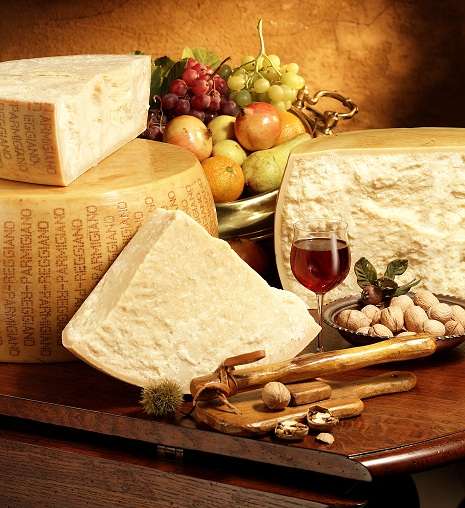 Parmesan cheese is a popular type of cheesed used all over the world, particularly as a topping for Spaghetti and pasta dishes.
Parmesan cheese is a popular type of cheesed used all over the world, particularly as a topping for Spaghetti and pasta dishes.
However, while many companies market their cheese as Parmesan cheese, in actual fact it is not, as parmesan cheese by definition must be produced in the Parma region of Italy.
Parmesan cheese is noted for its distinct taste and hard texture which are a result of their lengthy and very specific production procedures.
History of Italian Parmesan Cheese
It is not known exactly when the production of Parmesan cheese started; however, there is documentary evidence confirming that Parmesan cheese was being produced in the Parma area of Italy at least seven hundred years ago.
Although there have inevitably been some modifications and alterations in the materials used to produce Parmesan cheese, which are due to 20th century technological developments, the basic process of producing Parmesan cheese has not changed for hundreds of years.
How is Italian Parmesan cheese made?
The process for making Parmesan cheese is lengthy and arduous. Firstly, Parmesan cheese is made with a special blend of two different types of cow’s milk.
The full cream milk that is taken from the cows in the morning is mixed with the skimmed milk taken from the same cows on the previous evening.
Those cows whose milk is used to produce Parmesan cheese are fed only on grass and hay. This gives the milk with which Parmesan cheese is made a unique consistency that shows in the texture of the cheese later on.
The milk is then heated and stirred in huge copper vats which are used specifically because they heat up and cool down so quickly. The curd is then lumped into cheese cloths and made into the shape of a wheel using a metal brace.
Salting Italian Parmesan Cheese
One of the characteristics of authentic Parmesan cheese is that it contains no additives or artificial flavourings. The only thing that is allowed to be added to Parmesan cheese to help bring out its flavour is salt. This is done by soaking the wheels of Parmesan cheese in salty brine for a period of twenty days. Once the brining process is finished it is then time to let the Parmesan cheese mature and develop its flavour.
Aging Italian Parmesan Cheese
Parmesan cheese must be left to mature for at least 12 months and often this period can be up to two years. The cheeses are kept in special temperature controlled rooms and cleaned regularly while aging. Every wheel of Parmesan cheese is individually inspected to ensure it meets the necessary standards before it is sent for sale.




